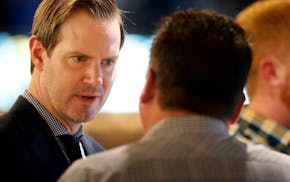The Ryder Cup was a very large deal in the mid-'90s. At that time, Minnesota native Tom Lehman was among the best players in the world. This combination allowed a Minneapolis sportswriter to convince the editors it was a service to Star Tribune readers to send him to Spain to cover the 1997 matches.
As a bow to fiscal restraint, the sportswriter signed up for a lower-priced media hotel and wound up in an ant trap 90 minutes removed from Valderrama, the site of the competition.
This drive took place on N-340, a highway with two lanes in both directions, generally separated by a line of white paint. The highway careened through crowded towns, which did not deter the Spanish wheelmen from keeping their speed as close to 100 kilometers per hour as possible.
One assurance we had been given before arriving was that there had not been September rain in the province of Andalusia for more than a decade. And that's what made the N-340 commute even more adventurous on this trip: Violent thunderstorms struck several times, before dawn or late at night.
The Ryder Cup itself was such high entertainment that a few near-death experiences were a small price to play.
This was the Ryder Cup in which Seve Ballesteros was the captain for Europe and Tiger Woods was making his debut for the United States.
It was a meeting of gigantic forces, for it was Ballesteros, as the dashing young Spaniard, that caused the powers in charge to turn these matches into USA vs. Europe (rather than Great Britain-Ireland) in 1979. And it was Woods, the dynamic young Californian, that was causing golf to reach a new, non-traditional audience in America in 1997.
After the change to include continental Europe in 1979, the U.S. (1979-81-83) and Europe (1985-87-89) exchanged three-match winning streaks, then the Yanks came back with victories in 1991 and 1993.
They were looking for another three-match winning streak in 1995 at Oak Hill in Rochester, N.Y. Part of the U.S. advantage going into late Sunday afternoon came from a singles match between Lehman and Ballesteros.
Lehman was in a stretch of several years when he hit the ball closer to the pin than anyone on the planet. Ballesteros had fallen out of his prime sooner than most great players, largely because a guy needs very young nerves to pull off all those miraculous rescues.
On this day, Seve was again golf's magician. He used chip-ins and amazing flop shots and long putts to stay even with Lehman across most of the front nine. Finally, the Houdini act ran out, and Lehman put away Seve 4 and 3, and the Yanks appeared on the way to victory.
Until a stretch of a few minutes, on the last holes of the final matches, when Lanny Wadkins' team started choking everywhere you looked, and Europe was handed the Cup.
The Euros won again at Valderrama, and were on the way to drubbing the U.S. in 1999 at The Country Club in suburban Boston, until the Americans' singles slaughter arrived on Sunday.
It was not a triumph for golf etiquette, as the Yanks raced around the green to celebrate Justin Leonard's magnificent 45-foot birdie putt against Jose Maria Olazabal on No. 17, but it created a patriotic frenzy -- both on that historic course and across the country -- that made the Ryder Cup a bigger deal on the American sports scene than at any time.
You can make that any time, before or since.
Two years later, the swine of the Earth struck the Twin Towers, and we discovered important reasons for patriotism, and the Ryder Cup matches were pushed back to the fall of 2002, changing the biennial clock.
The Euros are 3-1 since then and 8-7 since the matches became Europe vs. USA in 1979.
The sides meet for the first time in Wales starting Friday. There is some drama, with the now-tarnished Woods said to be upset with Rory McIlroy. Europe's wunderkind said he looked forward to facing Tiger, and Woods responded, face-to-face: "Be careful what you wish for."
So there's that, but does Tiger still have enough fans for us to care if he's able to show up the Irish kid? Doubtful.
And with the ever-increasing numbers of Euros on the PGA Tour, competing with Yanks in big events 20 times a year, do we still look at the Ryder Cup as the place to validate American golf prowess? Doubtful.
The Ryder Cup is entertainment now, not a cause for high tension or patriotic frenzy.
Patrick Reusse can be heard noon-4 weekdays on 1500ESPN. • preusse@startribune.com

Reusse: Wolves need stopper for Booker? NAW, it's not a problem.

Reusse: Success on court helped Timberwolves do strong business

Reusse: Taylor's story. 'I just bought the Minnesota Timberwolves.'

Reusse: Back from injury, Towns doesn't have to carry load

